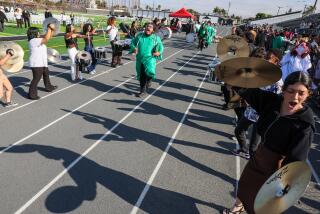Youth Band Finding It Harder to Keep Tempo of Past Honors
- Share via
The band marched proudly down Hollywood Boulevard. Looking crisp in their red, blue and gold uniforms, the young musicians launched into a rendition of “McNamara’s Band,” the piece they had practiced especially for the annual Greater Los Angeles Irish-American St. Patrick’s Day Parade.
Suddenly, nearly a fourth of the marchers lowered their instruments and stepped onto the sidewalk. Sauntering casually behind the crowd of onlookers they hovered a moment, then walked in a ragged group several blocks west before rejoining the parade.
In the interim, the depleted columns still in the street marched smartly to the judges’ stand, paused at attention in front of it and played an anthem, “That’s the Spirit of Liberty,” in brisk military style while a corps of young girls in short colorful skirts waved flags and a majorette twirled a baton.
Thus the Long Beach Junior Concert Band, competing against 11 other musical groups in one of Southern California’s many competitive parades, won another sweepstakes. But it won by fewer points than usual, said director Marvin Marker. And if those musicians had not dropped out, he said, the band would not have won at all.
Band in Decline
For 37 years the group, officially composed of youths ages 12 to 21, has been a Long Beach institution and one of the region’s handful of independent youth bands. Now it has fallen on hard times, experiencing, among other things, the loss of its regular rehearsal space and a dramatic decline in membership.
To bolster sagging numbers, Marker recently invited band alumni to return to the fold. Because they are over 21, however, their presence during parade judging could lead to the group’s disqualification. So when participating in parades, the alumni move off to the side during judging.
“They are good teachers,” Marker said of the 19 alumni and adult staff members who routinely march with the band’s 51 regular musicians. They are also providing much-needed stability, he said, while the group seeks a permanent home.
Marker founded the band in 1952, when he was a 16-year-old Wilson High School student. The initial idea, he says, was to create a way for student musicians to continue playing during summer vacations when school was out.
Hawaiian Shirts
About 40 musical friends showed up for the first rehearsal, recalls Marker, now 53. The group made its debut in that year’s Westminster Fiesta Parade wearing Hawaiian shirts, and received such an enthusiastic response that it decided to remain together year-round. Three years later, after a fight for financial support, the band took the grand prize at a parade in Las Vegas.
Since then, Marker says, the group has won more than 1,000 first-place or sweepstakes trophies. It averages about 65 parades, concerts and other shows a year in such diverse locations as Portland, Ore.; Prescott, Ariz., and Hawaii. In addition, he said, the band has been featured in television commercials and promotional videos, establishing a statewide reputation for excellence.
For its first 20 years, Marker said, the band was a hobby supported by his work as a production manager at Disneyland. Since 1972, he said, he has been its full-time director and the only salaried member of its staff.
“They’re a wonderful entertainment band,” said Ronnie Lomas, parade coordinator for Pageantry Productions, a Lynwood-based company that produces parades all over the state, including the recent Hollywood event. Lomas said she would rate the Long Beach Junior Concert Band as one of the top two marching bands on the West Coast. “They have showmanship,” she said. “They don’t just play at the judges’ stand and march away; (Marker’s) unit performs for the crowd.”
At its height in the late 1970s, Marker said, the band had 156 musicians and 45 pageantry performers, including dancers and flag girls.
Then came Proposition 13, which greatly reduced property taxes and diminished public school incomes.
The group had been rehearsing at local high schools, but school officials began charging for the use of facilities. So the band--an independent nonprofit entity operated on about $80,000 a year from fund-raisers, membership dues, corporate donations and an annual city stipend--began meeting in unused buildings. They rehearsed in an abandoned fire station for the first two years, and later in a boys’ club.
In 1985, Marker said, the group moved its rehearsals to an abandoned warehouse at Spring Street and Pacific Avenue. But last year the warehouse was acquired by a new owner determined to redevelop the property. So for the last several months the band has been rehearsing at the Veterans Park Clubhouse on Pacific Avenue, a city-owned facility that is hosting the group for free.
The only problem, Marker says, is that the 2,500-square-foot room is not big enough to meet the organization’s wide-ranging musical needs. The group’s 21 dancers and flag girls practice on a patio. And its 13 drummers practice in a nearby kitchen by rapping their sticks on a wooden table rather than on their instruments with the band.
Meeting twice a week, Marker says, the band has had to reduce its weekly practice time to a total of about four hours to allow time for setting up and breaking down equipment before and after rehearsals.
One result of the instability is a nearly 30% decline in the number of musicians just in the last year, bringing band membership to 51--its lowest since shortly after the group was formed.
Losing Championship Status
“I don’t think the band is in danger of disappearing,” Marker said, “but it is in danger of losing its championship status.”
While the group is still winning trophies, he said, it is winning them by fewer and fewer points. And last year for the first time in memory, he said, the band failed to win the sweepstakes in several of the parades it entered.
“The kids in the junior concert band are on the street,” Marker said, referring to their marching activities, “but they’re there to do good. Everyone needs to be proud of something, and when these kids win they stand tall.”
To offset the downward trend, Marker recently began visiting local junior high schools in search of new members. While school bands sometimes compete with Marker’s group in parades, they are generally supportive of it as a positive educational experience for their students, an attitude Marker encourages by insisting that his musicians give first priority to the needs of their school bands.
And to provide some morale-boosting stability while his group searches for new quarters, Marker began inviting the alumni.
“This is my second family,” said Dave Ford, 25, a mail room clerk who plays saxophone. He first joined the junior concert band in 1979 at age 14. “It’s an organization I’ve grown up in. Marvin Marker sort of raised me,” he said.
Said Colleen Davis, 32, a Long Beach mother who was in the band from 1970 to 1975 and recently returned to play glockenspiel: “I realized that the band had given me so much that I wanted to put something back. I want the band to be here for my son.”
Regular youth members seem to be taking the invasion in stride.
“At times it’s a problem,” said Don La Plume, 20, leader of the band’s trumpet section. “The alumni are very anxious to help, a little too anxious sometimes. Sometimes they think they have special privileges (such as ignoring directions), and then I have to put them in line.”
More to Read
Sign up for Essential California
The most important California stories and recommendations in your inbox every morning.
You may occasionally receive promotional content from the Los Angeles Times.












